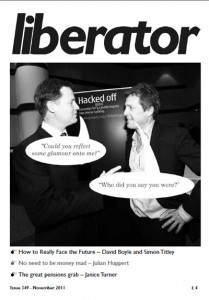Liberal Democrat Newswire #41 is out: what does “weekend” mean?
 Edition #41 of Liberal Democrat Newswire came out last week, looking at how Nick Clegg is taking an improbable leaf out of Liberator‘s book. (Not its songbook; it is Nick Clegg and not Lembit Opik we’re talking about after all.) Also featured are the debates in the party over what the word “weekend” means and a special offer for readers from Biteback Publishing. You can now read it in full below.
Edition #41 of Liberal Democrat Newswire came out last week, looking at how Nick Clegg is taking an improbable leaf out of Liberator‘s book. (Not its songbook; it is Nick Clegg and not Lembit Opik we’re talking about after all.) Also featured are the debates in the party over what the word “weekend” means and a special offer for readers from Biteback Publishing. You can now read it in full below.
If you would like to receive the next edition of Liberal Democrat Newswire direct to your own inbox as soon as it is published, just sign up here. It’s free!
You can unsubscribe whenever you want using the link on the bottom of all the emails, and I won’t pass your email address on to anyone else (except if required by law).
And if you are already a reader and like it, why not Like my Facebook page to help publicise the newsletter to others?
 Liberal Democrat Newswire #41: Nick Clegg adopts the Liberator strategy |  |
Welcome to the 41st edition of Liberal Democrat Newswire. This time it’s back to the traditional round-up of different stories rather than looking at one theme in depth. Below you’ll find out why legal minds in the party are arguing over the definition of “weekend”, some Christmas gift ideas from your politically-minded friends – including a special offer for readers from Biteback Publishing – and how Nick Clegg is adopting the strategy long promoted by a magazine described by then Liberal Party leader David Steel as “a trashy rag run off on a duplicator”. If you like this newsletter, the chances are other people you know would like it too, so please do share it. Thanks for reading and, as ever, do please let me know your views. Mark In this newsletter:
Nick Clegg takes the Liberator line In a somewhat improbable turn of events, Liberal Democrat leader Nick Clegg is increasing copying the party strategy long advocated by the perennial critic of Lib Dem (and before that Liberal Party) leaders, Liberator magazine. In a somewhat improbable turn of events, Liberal Democrat leader Nick Clegg is increasing copying the party strategy long advocated by the perennial critic of Lib Dem (and before that Liberal Party) leaders, Liberator magazine.Liberator has been consistently critical of the party’s leaders and in particular of what it sees as their forlorn search to build far too broad a base of support. Instead of trying to win the votes of just about anyone, the magazine’s editorials have argued for several decades that the third party should concentrate on more controversial policy commitments, such as being strongly pro-European, which might put off many voters but would also (so the argument goes) build a bigger core party vote. After all, as 25% of the vote would be an amazingly good result for the party in a general election, how much does it matter if even a majority of the electorate doesn’t like the party? The party’s 2010 general election campaign was most certainly not from the Liberator playbook. The party’s appeal was set very broadly, looking to attract votes from just about anyone, and with a target seat strategy to match, going for a very broad front of seats in a way that helps explain why the party’s number of seats ended up falling despite an increase in votes. More recently things have been rather different, largely due to the influence of strategy advisor Ryan Coetzee (who, despite rumours in South Africa to the contrary, is not about to leave the UK for a job there). In a recent series of speeches Nick Clegg has taken policy positions that follow the Liberator strategy – setting out positions on the environment and Europe which are controversial, do not necessarily have majority support in the country but which fit with long-standing party beliefs and which also fit with trying to build a larger core vote. (He is in favour of both the environment and Europe, in case you wondered.) Civil liberties have, so far at least, been notably missing from this list. All that makes the party’s forthcoming new immigration policy something to keep a close eye on. At the time the policy review was launched, it appeared to many that it would move the party towards a much more immigrant-sceptic position, thanks to the floating of an immigration bonds idea. That idea, however, was quickly sidelined under a blizzard of protests from within the party, widespread criticisms from experts outside the party and a bevvy of quotes dug out by journalists citing Lib Dems previously opposing the very such idea. Add to that the logic of the European and environmental speeches – that the party’s immigration policies should steer clear of trying to broadly appeal to everyone but instead concentrate on carving out a larger core liberal vote – and it’s possible the immigration policy may yet do something very different from those fears. The contextFor more on the background to this strategy, see the previous Liberal Democrat Newswires: Closing the Lib Dem tax gapThe Liberal Democrats have invested huge political capital, not to mention rather a lot of public money, on raising the income tax threshold to £10,000 during this Parliament. As a result of the success in speeding up progress, the party is facing a ‘tax gap’ next year. The £10,000 limit comes into force in April 2014 and the party is already setting out its stall for having a general election manifesto policy of further increasing the limit up to the equivalent of what a full time worker on the minimum wage would earn. There is an obvious appealing logic and simplicity to saying that anyone on the minimum wage shouldn’t pay income tax, and it is also a rather more direct and quicker way of introducing in effect the Living Wage – as income tax cuts add to people’s income just as wage increases do. However, there is a political and economic gap between achieving something in April 2014 and then wanting to do something further after May 2015. What will the party be pushing for in the quartet of Budgets and Annual Spending reviews still to come before the next general election? It is hard to see a mansion tax being conceded by the Conservatives, although extra Council Tax bands for the most expensive houses is still something Lib Dem negotiators think is worth pushing for. At the weekend Nick Clegg staked out another tax policy to fill the tax gap – going for a further increase in the income tax allowance beyond £10,000 in this Parliament: Unable to load thumbnail for YouTube Video Id: wjQnBcNTn8I. Please make sure they exist and try again later. #404 Christmas gift ideas for politicosRead on and you’ll find a special set of offers from Biteback Publishing for readers of Liberal Democrat Newswire, including the new biography of Shirley Williams and Damian McBride’s must-read account of life as a Labour spin doctor turned drunken purveyor of political smears. Any of them will make a great Christmas present for political friends (or a little personal self-indulgence in case you fear your presents from others are just going to be socks again). If you’re looking for further ideas, here are my five top book recommendations:
If it is a Liberal Democrat you are looking for a present for, then there is always the perfect on-message gift that combines Alarm Clock Britain with anchoring our politics in the centre ground. What is a “weekend”?Imitating Maggie Smith in Downton Abbey, various Liberal Democrats are wandering about asking “what is a weekend”? It is a word that appears but once in the Liberal Democrat party’s federal constitution, but it is an appearance that is causing legalistic arguments to fly back and forth over quite what it means. The cause is clause 6.6 of the constitution which states that,
This is a problem for those who want either to axe completely or scale back to a single day the party’s Spring conference. Presented as being a cost-saving proposal, the idea has bombed so far within the party, getting a near-unanimous thumbs down at a consultation session held at the last party conference. Also very hostile to the plans are both the party’s Federal Conference Committee (responsible for organising the conferences) and the Federal Policy Committee (responsible for much of their policy content). More suspicious party activists also fear that the proposals are motivated by a desire to reduce the number of opportunities for the party to hold its leadership to account. Given this widespread resistance, it is hard to see how a constitutional amendment could get the necessary two-thirds majority at a party conference in order to remove the requirement for “a weekend” conference to be held each year. Hence the attempts to argue that a short event over just one day still meets the requirement. If that is the case, it just takes a couple of party committee votes to implement the plan for Spring conference and if that were done, it would then be much easier to defend the new status quo (especially with arguments such as “but we only have booked the future venues for one day”) than it would be to get that two-thirds majority. The exchanges of legal arguments means the issue is now up with Federal Appeals Panel to rule on. Special offer from Biteback for readersAs a special offer to readers of Liberal Democrat Newswire, Biteback (publishers of my book, 101 Ways To Win An Election), are offering Amazon-beating prices on a range of great political books. To buy any of these titles, just visit https://www.bitebackpublishing.com/promotions and use the code listed under the book cover below.
To buy any of these titles, just visit https://www.bitebackpublishing.com/promotions and use the code listed under the book title. Sign up to receive future editions of Liberal Democrat NewswireAre you reading a forwarded copy of Liberal Democrat Newswire? Or perhaps a web-based version? If so, then why not join thousands of others and sign up to receive direct to your email inbox future editions of what the Daily Telegraph calls a “must read”? Sign up to receive future editions of Liberal Democrat Newswire here. 101 Ways To Win An Election
101 Ways To Win An Election is available from Amazon (paperback and Kindle editions). For Apple fans it is available on iTunes as an iBook for iPad, iPhone and iPod. Users of Kobo readers are also catered for with the Kobo ebook version. Thanks – and please forwardI hope you’re found this edition of Liberal Democrat Newswire interesting, informative, useful – or all three! Like this newsletter? Then let your friends know about it too. Just point them at this sign-up page. Best wishes and thank you for reading, Mark | |




Leave a Reply